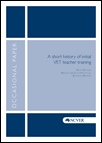Description
This paper examines initial VET teacher training from the late 1979s to the present, based on the literature and the author's personal experiences. While much has changed, many of the issues and approaches that are apparent in the early literature remain the same today. There is cause for optimism and the author proposes a number of approaches to improve the quality and relevance of initial teacher training. Such training is only a first step, however, and access to further formal training and professional development is vital to maintain and build teachers' skills.Summary
About the research
This paper examines the history of initial VET teacher training, both through the literature and the author's own experience. It also provides a backdrop to Guthrie and his colleague's examination of current practice in teacher training. Their forthcoming report, Initial training for VET teachers: a portrait in a larger landscape, is a clear reminder that initial teacher training is only the first step in ongoing professional development for the sector's teachers.
There is an unprecedented interest in VET teachers, the quality of teaching and teacher training at present. However, as Guthrie points out, this is a road well trodden and, unfortunately, issues identified earlier remain unresolved. But Guthrie is optimistic.
Key messages
- The minimalist regulatory approach of the Certificate IV in Training and Assessment as the mandated qualification for VET teachers and trainers needs to change and it is time to accept a broader range of qualifications as a suitable foundation for teaching in VET. This should be based on a wider range of issues: the teaching role, the provider profile and the characteristics and needs of their students.
- A more rigorous application of regulatory requirements for staff to maintain vocational competency and develop their teaching skills will ensure that teachers do not remain with minimal qualifications.
- The 'skill set' approach mooted for the new Diploma in Training and Assessment will lead to more formal professional development being taken up by staff. These skill sets need to be based on specific work roles as well as generic teaching and assessment skills.
- More active collaboration between universities and the VET sector will yield better teacher training and professional development.
Tom Karmel
Managing Director, NCVER
Related items
This report provides a portrait of the initial formal training for VET teachers in private and publi… Show more
